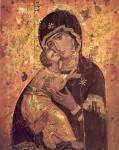15th Sunday Ordinary Time, year ’C’
"And now a lawyer stood up and, to test him, asked, ’Master, what must I do to inherit eternal life?’
Jesus asked him ’What is written in the Law?’
He answered’ You must love the Lord your God with all your heart, with all your soul, with all your strength, and with all your mind, and your neighbour as yourself." But the man was anxious to justify himself and said to Jesus’ And who is my neighbour?’
Jesus answered ’A man was once on his way down from Jerusalem to Jericho and fell into the hands of bandits ; they stripped him, beat him and then made off, leaving him half dead."
The Shema’Israel , and a passage of Leviticus on the love of neighbour with Jesus adding on a parable which gives the dynamic response.
This stranger has put into place his mercy, his goodness towards the wounded man on the road. Behind this wounded man is hidden Christ who saves us by bringing up compassion in us.
Christ is the image of the invisible God, he fell in agony, nailed on the wood like a murderer. Madness for the Jews, scandal for the pagans, but wisdom for those who love God. Jesus really did make himself the poorest person of the whole of humanity.
We contemplate him weary at the side of the well with the Samaritan, asking this woman for something to drink. This ’I thirst’ will reappear when he will be half dead hanging on he cross.
"Now a priest happened to be travelling own the same road, but when he saw the man he passed by on the othr side. In the same way a Levite who came to the place saw him, and passed by on the other side.
But a Samaritan traveller who came upon him was moved with compassion when he saw him. He went up to him and bandaged his wounds, pouring oil
and wine on them. He then lifted him on top his own mount and took him to an inn and looked after him."
We can make out this Samaritan’s emotion when he comes next to the victim, he is ’moved’. But this wounded man needs to be cared for and lifted up onto his mount to transport him to the inn. He will come back to pay! This is what being close to someone means! This is what it means to love, stopping when faced with suffering, by finding the words and gestures that save. We can imagine the joy of this wounded man when the stranger comes up to him, seeing the distress he is in. He is taken up with love, compassion and tenderness for him. This man who is a victim had nothing to do in the situation, but he is there on the roadside, wounded and half-dead.
God is present in a mysterious way in this having him get up again to stand on his own two feet, taken into care by this pilgrim. We are in a state of wonder when faced with the Tenderness of the Father who envelops us with this welcome. He has sent Jesus to us in order to carry our load.
"The next day, he took out two denarii and handed them to the innkeeper and said, ’Look after him and on my way back I will make good any extra expense you have.’
Which of these three, do you think, proved himself a neighbour to the man who fell into the bandits’ hands?’
He replied ’The one who showed pity towards him.’ Jesus aid to him ’Go, and do likewise.’
This is a first step that engages a whole road to charity. If we are moved, we enter into the imitation of God by paying with ourselves. The road going down from Jerusalem is our road, we take it every day. It is the road of our work, the road of our responsibilities, of our solidarities, of our fraternities.
Jesus announce the vocation of Christian which is to serve Him in the poor so as to walk with God. If we want to be following Jesus this Good Samaritan, we need to rest upon his Heart and drink form the Living Sources.
Jesus, in order to heal our wounds, turned Himself into Bread of Life. He still comes to us today in his poor people like a beggar demanding our love. In this attachment we are going to get closer to the poor, tend to their wounds by
pouring oil and wine of the sacraments, taking them on to our transport which is the Church.
Jesus commends the poor to the community, he doesn’t forget or ignore them. In Jesu’ distress, Mary remained close to Him at the Cross. She accompanies Him, is ever the bride of his Heart, she knows how to fill Him with tenderness. She will be ever faithful to Him.

